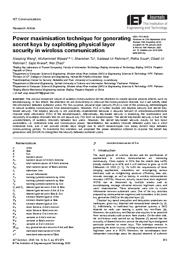A copy of this work was available on the public web and has been preserved in the Wayback Machine. The capture dates from 2021; you can also visit the original URL.
The file type is application/pdf.
Power Allocation Scheme for Secret KeyGeneration in Wireless Communication
2020
IET Communications
The intrinsic broadcast nature of wireless communication let the attackers to initiate several passive attacks such as eavesdropping. In this attack, the attackers do not disturb/stop or interrupt the communication channel, but it will silently steal the information between authentic users. For this purpose, physical layer security (PLS) is one of the promising methodologies to secure wireless transmissions from eavesdroppers. However, PLS is further divided into keyless security and secret
doi:10.1049/iet-com.2019.0956
fatcat:x3ya7nciazb47hczsgtl6xazi4

